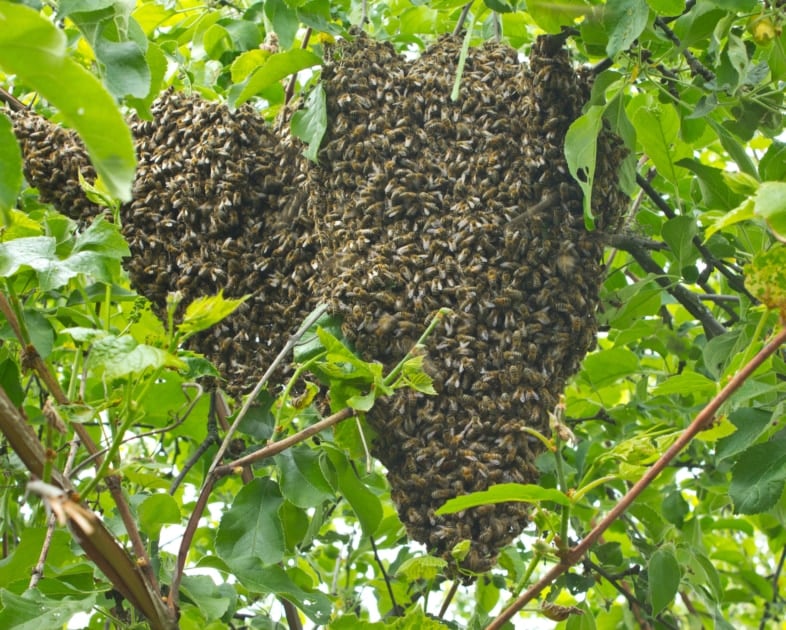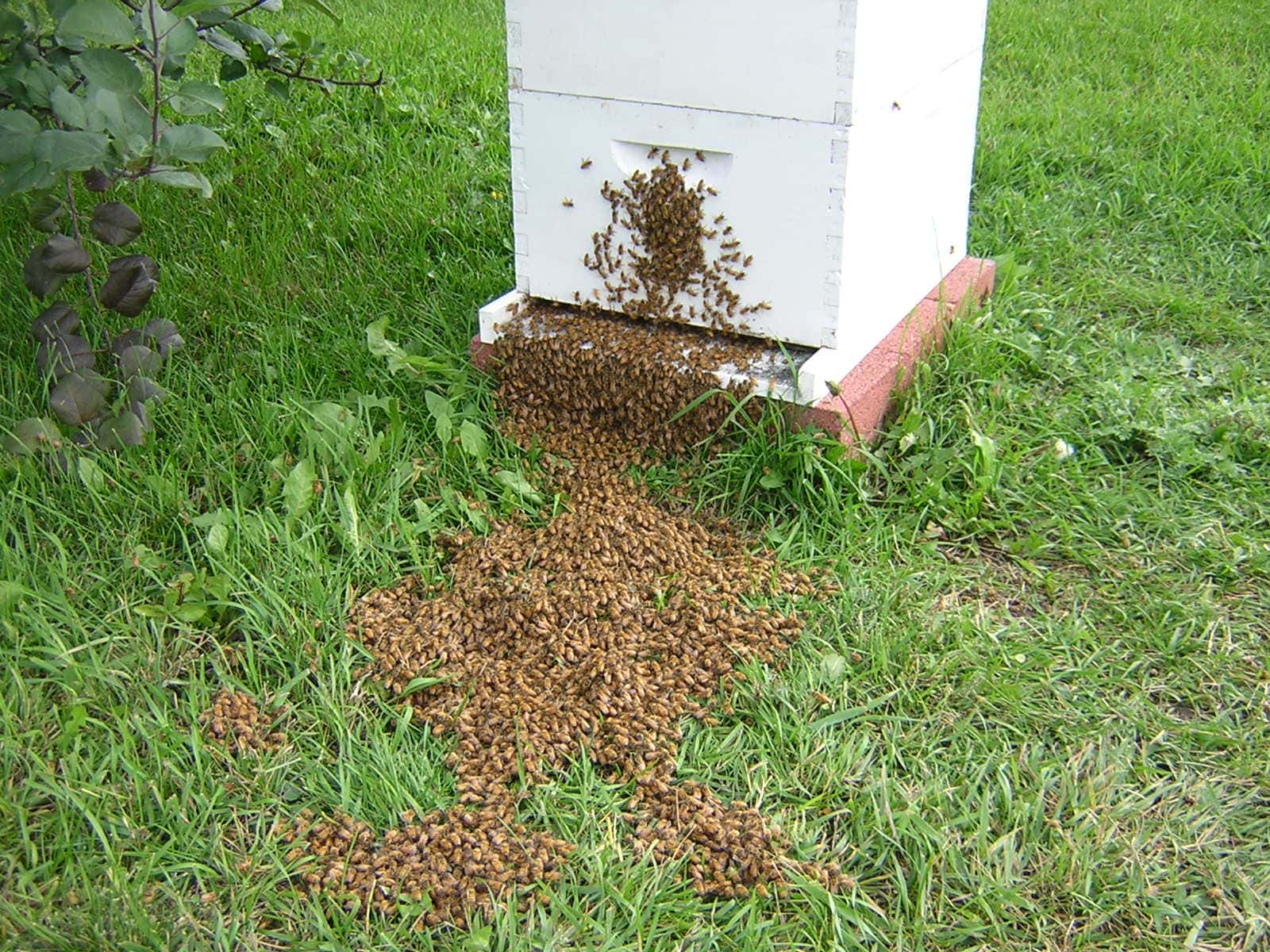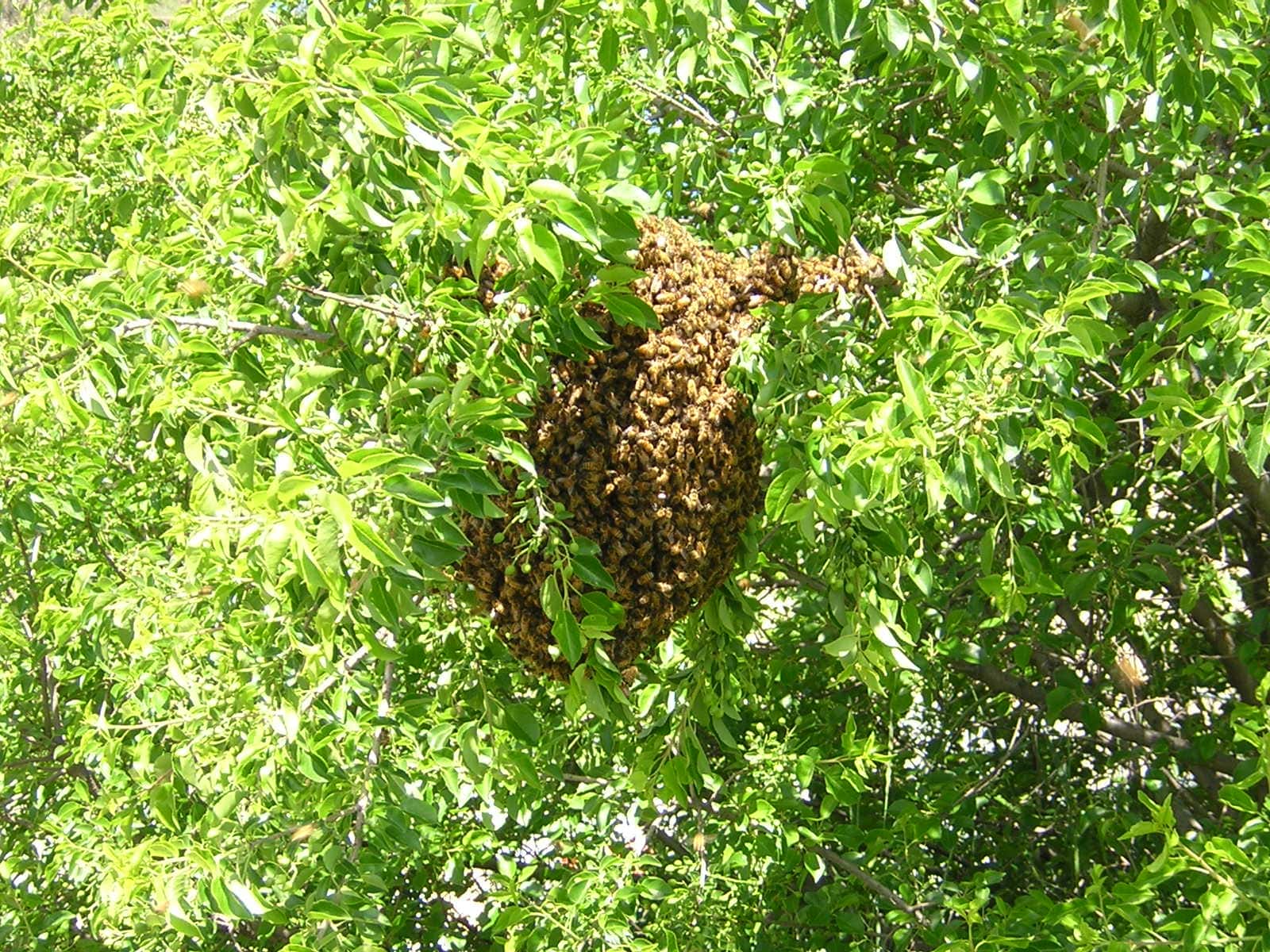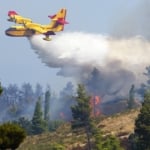What Is Bee “Swarming” Exactly?
A swarm of bees sounds scary, but there’s no need to panic. We explain what they're doing, why they do it, and how you can help.

Amy Grisak and her husband, Grant, live in Montana with their boys and often share stories with us about their adventures as beekeepers.
A “swarm of bees” sounds scary, and is enough to send shivers down the spine of many people, but there’s no need to panic. These traveling honey bees are simply finding a new home.

Why Do Bees Swarm?
Swarming is a natural phenomenon that typically occurs in the spring. After surviving winter by relying on their honey reserves, bee hive activity increases as the days become longer and warmer. During this time, the queen lays up to 2,000 eggs per day, which transform into adult bees in just three weeks. By early to mid-spring, the hive becomes crowded with tens of thousands of new bees.
When the bees sense overcrowding or when conditions in the hive become less favorable, they create larger cells in the brood chamber to feed the larvae with royal jelly, thus producing a new queen.
Recognizing signs of swarming can be challenging for beekeepers unless they diligently monitor their hives. Signs may include bees overflowing from the entrance or the presence of queen cells. Otherwise, you might wake up to find that half of the hive has swarmed, even with vigilant observation.
I experienced my first swarm two decades ago. I thought something was amiss because the bees’ buzzing seemed extraordinarily loud. Imagine my surprise when I saw a group of them clustered on a small lodgepole pine tree. Thankfully, this was an easy retrieval, as I only had to snip the tree below the cluster and shake them into a new hive body (wearing protective gear, of course!).
However, not everyone is as fortunate. A couple of summers ago, a resident living near the alfalfa fields where we keep some of our bees called to inform us of odd bee behavior. When my husband Grant investigated, he found that half of the hive had departed, leaving behind bees robbing hundreds of pounds of stored honey. Our strongest hive had taken off, taking most of their honey along. Despite searching in cottonwoods and other favored bee locations, the swarm was never found.

what Should You Do if You See Swarming?
Honey bees are precious these days, which is why it’s important to try to save a colony if you see one swarming, or if you have one in a spot where you don’t want it. During a swarm, bees tend to gather on a tree or branch for a brief period, ranging from a few minutes to a couple of days. This gives the “scout” bees a chance to locate a new location. The good news is that swarming honey bees are generally calm since they are preoccupied with carrying honey and do not have a hive to defend. However, this does not mean you should provoke them. It is a great opportunity to observe them from a safe distance while exercising caution.
The best way to help out the honey bees is to call a beekeeper in your area to capture the swarm. You can find one by searching for local beekeeping organizations, or contact your local Extension office, as many offer beekeeping classes and might have the information of who keeps bees in your town. Contacting any of these organizations is a good step in finding a beekeeper who is more than happy to rescue a colony. Typically, a beekeeper will not charge for a removal, unless there is an additional cost for equipment rental, as the bees are valuable enough.
How the bees are captured completely depends on where they’re located. I was fortunate early on because we were surrounded by tiny lodgepole pines, making it easy to handle. But when the cluster of bees is higher in the branches, it might require a ladder or a cherry picker to reach them to either shake the bees into the box or snip off the branch to bring down and shake.
Sometimes, the bees end up in odd places. Like on the roof of a hot dog cart in Times Square. One time, Grant captured a swarm that nestled itself within the wheel well of a parked vehicle. With a hive tool, he gently scooped the bees from the wheel well onto a frame, being particularly careful to gather the queen who is protected by the workers in the middle of the cluster, and then slid the frame into an empty hive body.
In another instance, there was a feral hive established in the soffit of a barn, which was converted to a guest house. When bees are within a structure, it’s far more challenging. You can’t simply seal them up or kill them since the smell of tens of thousands of rotting bees and larvae would be terrible. Thankfully, the owners wanted these bees saved, so Grant went up in a cherry picker and removed enough of the soffit to reach the hive. He carefully sliced off the honeycomb and placed it in an empty hive body. It was a textbook removal, and those bees made up one of the best hives we had.
How Can You Help?
Swarming bees might look intimidating, but they’re not. You can help them by keeping an eye on them, especially if they leave their initial cluster area, and call a beekeeper who will give them a safe new home.

Amy Grisak
Amy Grisak is a freelance writer, blogger, and photographer specializing in gardening, local food, and stories about her home state of Montana. She enjoys sharing her experiences with self-reliant living and outdoor recreation. Her article on the "hugelkultur" gardening technique appears in the 2021 Farmers' Almanac. You can follow her topics on her site, AmyGrisak.com.






Thank you for this article, so informative and everyone needs to know what to do or whom to call for such a task as this. It would also be a good thing to look this information up and have it near by in case you should come across this situation on your on property . Glad to see this on your sight . Thank’s again.
I was touched by Trish’s comment about crying when she was stung by a bee knowing that the bee would die. This degree of compassion is rare in this day and time. My young daughter praised me years ago for braking the car, as we rode along, to avoid striking a butterfly. This memory I will never forget.
I know of a young-ish, (lol) man who would press on the brakes of his vehicle for EVERY critter, be it little or BIG, he saw in the line of view in front of his vehicle! He would also honk the horn to warn it to move. If it didn’t, he would come to a stop right in the road, until it was out of the way!!!
76 years old now enjoying memories of growing up a beekeeper’is daughter. Recall lying on my belly by a hive after putting a spider ‘neath hive top. Waiting till diligent workers pulled dead intruder from entry of hive. I know. Cruel…but with no tv or other fun things…?! Maybe I was 6 or 7. Also remember helping dad bring hives home from mts in NC and hearing rattle of snake seeking warmth beneath hive. Dad warning to put hive back in place and walk away…quickly. Remember the smell of honey house. And the smell of my dad after a day of working in the hives. And an occasional night when he came home for dinner with a stinger in his arm…unnoticed. And remember crying if we got stung…knowing that innocent bee was gonna die because of us. But as to swarms? Dad always had burlap bag in his truck. If he came across a swarm…it came home in that bag, resting on front seat of truck, top tucked beneath his leg.. Let’s pray our bees survive.
Ur
Trish, wish you would write a book! You have a way with descriptions. They paint great pictures in my mind. Be well, Beekeeper’s Daughter.
Around mid March of this year, in Ormond Beach, FL. a swarm of bees was on one of our Japanese plum trees. It appeared out of nowhere. We called our neighbor who has bees, but she said they weren’t hers. She gave us the name of a bee keeper, we called and he said he would be out as quickly as possible, it took him 1 1/2 hrs, and by that time the swarm disappeared! We looked all over our farm to see if they were close, but no luck. He was really disappointed as he had lost one of his hives and was really looking forward to replacing them. Thanks for this information, if it happens again, we’ll know what to expect.
Around Mid March in Ormond Beach, FL, we had a swarm that took up on one of my Japanese Plum trees. We live on a farm and are always surprised at what nature gives us. We called a neighbor who had bees, but she said they weren’t hers. She gave us the name of a beekeeper who we called. It took him about 1 1/2 hrs to get to us, and by the time he arrived, they disappeared! We looked all around our property, but no luck, they were gone! He was real disappointed, as he had lost one of his hives and was anxious to relocate them.
For the last 4 years an old apple tree has been home to honey bees. Poor old rotten tree was sceduled to come down when we discovered them. We witnessed 2 swarms so far, and the Ext. Office gave me a list of bee keepers who were able to re-home them. ♡♥♡